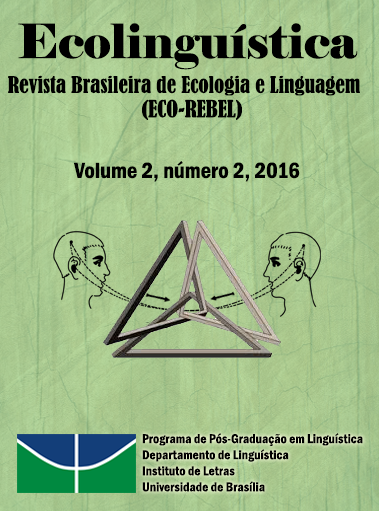Sequencialidadade: por uma ecologia do texto
Keywords:
Text; dynamicity; spatiotemporality; sequentiality; ecology.Abstract
An ecological view of text production and consumption involves placing the text in a total world context. Context should not be seen as a static collocation of features or parameters; rather, it is a constantly evolving conglomerate of ever-changing conditions, both human and worldly. In particular, a context is never fixed in time; and the way we act in a context involves a constant adjustment of our activities, both verbal and nonverbal. This point of view has consequences for our understanding of both world and text: what I call ‘sequentiality’ is therefore a main constituent of our ecological text activities and a necessary precondition for our understanding and handling of a text, either written or spoken. Moreover, this way of conceptualizing and realizing context has not only theoretical importance: I will also try to show that applying this line of thought to ordinary human conversational interaction may have fruitful effects, and in particular enables us to do away with a mechanistic interpretation and analysis of conversation as it is currently practiced in CA and related enterprises.
Downloads
References
ARUNDALE, R. B. ‘Pragmatics, conversational implicature, and conversation’. In: Fitch, K. & Sanders, R. (eds.) Handbook of Language and Social Interaction. Mahwah, N.J.: Erlbaum, 2005, p. 41-63.
_______; GOOD, G. ‘Boundaries and sequences in studying conversation’. In: FETZER, A.; MEIERKORD, C. (orgs). Rethinking sequentiality: Linguistics meets Conversation Analysis. Amsterdam & Philadelphia: Benjamins, 2002, p. 121-150.
BAUMAN, R.; SHERZER, J. (orgs.). Explorations in the ethnography of speaking. Cambridge: Cambridge University Press, 1974.
GU, Yueguo. The activity type as interface between language and parole, and between individual and society: An argument for trichotomy in pragmatics. Pragmaticsand Society v. 1 n. 1, 2010, p. 74-101.
GUMPERZ, J.; LEVINSON, S. C. (orgs.). Rethinking linguistic relativity. Cambridge: Cambridge University Press,1996.
HAUGH, M.. The constitution of politeness implicature in conversation. Journal of Pragmatics 39, 2007, p. 84-110.
KECSKES, I. A cognitive-pragmatic approach to situation-bound utterances. Journal of Pragmatics 32, 2000, p. 605-625.
LEVINSON, S. C. Pragmatics. Cambridge: Cambridge University Press, 1983.
_______. Interactional biases in human thinking. In: GOODY, Esther (org.). Social intelligence in interaction. Cambridge: Cambridge University Press, 1995, p. 221-260.
_______. 2000. Presumptive meanings. Cambridge: MIT Press.
MAYLE, P. Chasing Cézanne. New York: Vintage Books,1997.
MEY, J. L. Pragmatics: An introduction. Oxford & Malden: Blackwell Publishers, 2001 [1993].
SEARLE, J. R. 1975. Indirect Speech Acts. In: COLE, Peter; MORGAN, Jerry (orgs.). Syntax and Semantics, Vol. 3: Speech Acts, New York: Academic Press, 1975, p. 59-82.
Downloads
Published
How to Cite
Issue
Section
License
Authors who publish in this journal agree to the following terms:
Authors retain copyright and grant the journal the right of first publication. The work is simultaneously licensed under the Creative Commons Attribution License allowing the sharing of the work with acknowledgment of the authorship of the work and initial publication in this journal.
Authors are authorized to enter into additional contracts separately for non-exclusive distribution of the version of the work published in this journal (e.g., publishing in institutional repositories or as book chapters), with acknowledgment of authorship and initial publication in this journal.
Authors are allowed and encouraged to post and distribute their work online (e.g., in institutional repositories or on their personal page) at any point before or during the editorial process, as this can bring about productive revisions as well as increase impact.
Citation of published works (See The Effect of Free Access).



3.png)



